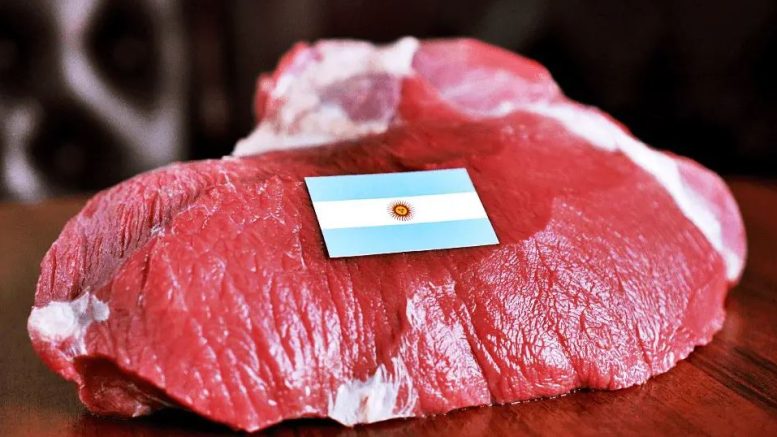Argentina Sets 100-Year Record in Beef Exports

Heavy rains in Argentina, with more than 100 mm accumulated, have improved soybean and corn crops’ conditions. (Rosario Stock Exchange)
100-year record in beef exports, with 935,261 tonnes, an increase of 10% in volume and 9% in value compared to the previous year. (Ministry of Agriculture, Livestock and Fisheries of Argentina)
Argentine Pork Industry Federation has asked Senasa to implement an Aujeszky’s Endemic Disease eradication plan following an outbreak in 2023. The plan presented in August 2024 has not yet been implemented. (FPA)
Corn exports exceeded 2.6 million tonnes shipped in January, an increase of 37.1%. Prices reached their highest levels in dollars since 2016. The harvest could reach 36.5 million tonnes. 4.9 million tonnes of exported wheat in the early 2024/25 season, 40% more destinations and 27% of exports to Brazil. (BCR)
Government has revoked Decree No. 322/1973, which banned the export of live cattle for slaughter, allowing these operations. The measure aims to promote Argentina’s greater inclusion in global trade and increase competition in the sector. The Ministry of Agriculture pointed out that cattle exports are sought after by markets with specific slaughter methods, such as Turkey, and cited that countries such as Australia, France, Canada, Uruguay and Brazil already export large volumes of live cattle. (MAGyP)
Argentina’s Secretary of Agriculture has announced a line of financing for fruit farmers in Patagonia to cover high harvesting costs. New rules for packaging were also presented, requiring only sanitary standards from the importing country. (Senasa)

Governor of the State of Pará, Helder Barbalho, revoked Law No. 10837/2024, which taxed agricultural exports, in order to maintain the sector’s competitiveness and avoid inflationary impacts. (Faepa)
Brazil’s National Bank for Economic and Social Development – BNDES reported a profit of US$ 4.63 billion, a 20.5% increase compared to 2023, and made the largest credit injection in its history, totaling US$ 48.47 billion. For the first time since 2018, credit for the industrial sector surpassed the credit for agriculture, with a 132% increase, totaling US$ 9.19 billion, while agriculture grew by 92%, reaching US$ 9.18 billion. (BNDES)
President of COP30, André Corrêa do Lago, said agribusiness is a victim of climate change and should bring a stronger image to the Conference, highlighting its incorporation of sustainability. (COP30)
In January 2025, the agricultural machinery sector grew by 23.3% in sales, with 32,3% in the domestic market Sales of tractors and harvesters increased by 53.9%. Exports fell by 22.3% to US$ 818 million. (Abimaq)
Kepler Weber reported a net profit of US$ 34.96 million in 2024, a decrease of 18.8%. The net revenue was US$ 280.70 million, with a growth of 6.3%. The company expects growth in 2025, driven by a record harvest in the country. (Kepler Weber)
Agro Cumaru, from the Mafra Group, plans to invest up to US$ 172.5 million by 2030 in warehouses, feedlots, and pasture conversion in the State of Pará, where it has already invested US$ 60.5 million. The company expects to generate US$ 51.8 million in revenue in the 2024/25 harvest, a 30% increase compared to the previous harvest. (Agro Cumaru)
From 2020 to 2024, the Bank of the Northeast (Banco do Nordeste) invested US$ 12.1 billion in the northeastern agribusiness, with highlights for the States of Bahia (US$ 3.2 billion), Maranhão (US$ 1.9 billion), and Piauí (US$ 1.7 billion). Agriculture received the largest share of resources, with 30% of the total allocated to the sector. The bank also supported innovation and strengthened family farming through National Program to Strengthen Family Farming and National Oriented Productive Microcredit Program. (Banco do Nordeste)
Bank of Brazil reached US$ 70.175 billion in circulating credit for agribusiness and family agriculture, a 12% increase compared to last year. The bank has already disbursed US$ 28.421 billion in this harvest and projects a growth of 5% to 9% in 2025. (Bank of Brazil)
“Correios Agro” project, which began in the State of Bahia six months ago, will be expanded throughout Brazil, allowing family farmers to send products such as coffee, honey and manioc derivatives by post. (MDA)
Aprosoja asks about the legality of State of Maranhão’s new law, which charges 1.8% on grain exports passing through the state. (Aprosoja – MA)
Confederation of Agriculture and Livestock of Brazil – CNA has criticized the government’s fiscal planning following the suspension of credit lines under the 2024/2025 Safra Plan, due to the rise in the Selic rate (interest rate) and the failure to approve the 2025 Budget. The CNA argues the government needs to review the decision and guarantee the promised resources, since the high Selic rate has increased the costs of equalizing interest rates. (CNA)
Agribusiness exports from the State of Minas Gerais grew by 18.1% in January 2025, reaching US$ 1.3 billion, despite a 29.5% drop in the volume exported. Coffee led the way, accounting for 72% of revenue and generating US$ 971.8 million (+70%). The meat sector earned US$ 113.2 million (+4.5%), with beef standing out (US$ 73 million, 15,000 tonnes), while chicken meat rose to US$ 32 million (16,000 tonnes). The soy complex plummeted 80.2%, with only US$ 16 million exported. (Seapa-MG)
Mato Grosso State Court approved the bankruptcy protection (similar to USA Chapter 11) of the JPA Group, which is facing a debt of US$ 22.1 million. (TJMT)
Ministry of Agriculture has launched the National Rural Roads Program, with the aim of expanding and rehabilitating local roads to improve the flow of agricultural production, connecting production regions to commercial and logistical centers. (MAPA)
Fruit exporters project strong growth in Asia. The sector has grown from US$ 500 million to US$ 1.3 billion in 2024. (Abrafrutas)


The country has received authorization to export cherries, kiwis, blueberries, frozen grapes and walnuts to Indonesia. (Blueberries Consulting)

Paraguay’s Ministry of Agriculture, with support from FAO, will carry out a study on the meat value chain to identify challenges and investment opportunities, using data from the National Agricultural Census. (MAG)

![]()
Peru and Uruguay signed a five-year agreement for agricultural innovation, genetic improvement, animal traceability and water management. (Ministry of Agrarian Development and Irrigation)
Government has invested US$ 67,500 in restoring pastures in Junín, benefiting 230 farmers and strengthening water recharge and family farming. (Midagri)
Dominus has become Peru’s leading exporter of frozen grapes, exporting around 900 tonnes in 2024, an increase of more than 100% on the previous year. (Dominus)
![]()
Livestock starts the year with good prospects, driven by sustained demand from China, attractive prices in Europe and dynamism in the US, according to Ricardo Reilly, representative of the Uruguayan Rural Association at the Uruguayan National Meat Institute. (INAC)
Sheep slaughter exceeded 21,000 heads last week, but is concentrated in just three slaughterhouses. (Uruguayan Wool Secretariat)

READ MORE:

